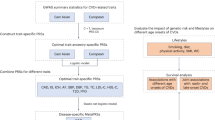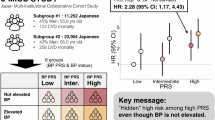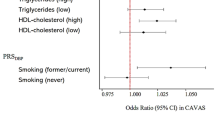Abstract
Although previous polygenic risk score (PRS) studies for cardiovascular disease (CVD) focused on incidence, few studies addressed CVD mortality and quantified risks by environmental exposures in different genetic liability groups. This prospective study aimed to examine the associations of blood pressure PRS with all-cause and CVD mortality and to quantify the attributable risk by modifiable lifestyles across different PRS strata. 9,296 participants in the Japan Multi-Institutional Collaborative Cohort Study without hypertension at baseline were analyzed in this analysis. PRS for systolic blood pressure and diastolic blood pressure (PRSSBP and PRSDBP) were developed using publicly available Biobank Japan GWAS summary statistics. CVD-related mortality was defined by the International Classification of Diseases 10th version (I00-I99). Cox-proportional hazard model was used to examine associations of PRSs and lifestyle variables (smoking, drinking, and dietary sodium intake) with mortality. During a median 12.6-year follow-up period, we observed 273 all-cause and 41 CVD mortality cases. Compared to the middle PRS group (20–80th percentile), adjusted hazard ratios for CVD mortality at the top PRS group ( > 90th percentile) were 3.67 for PRSSBP and 2.92 for PRSDBP. Attributable risks of CVD mortality by modifiable lifestyles were higher in the high PRS group ( > 80th percentile) compared with the low PRS group (0–80th percentile). In summary, blood pressure PRS is associated with CVD mortality in the general Japanese population. Our study implies that integrating PRS with lifestyle could contribute to identify target populations for lifestyle intervention even though improvement of discriminatory ability by PRS alone is limited.

This is a preview of subscription content, access via your institution
Access options
Subscribe to this journal
Receive 12 print issues and online access
$259.00 per year
only $21.58 per issue
Buy this article
- Purchase on SpringerLink
- Instant access to the full article PDF.
USD 39.95
Prices may be subject to local taxes which are calculated during checkout



Similar content being viewed by others

References
Mills KT, Bundy JD, Kelly TN, Reed JE, Kearney PM, Reynolds K, et al. Global disparities of hypertension prevalence and control: a systematic analysis of population-based studies from 90 countries. Circulation. 2016;134:441–50. https://doi.org/10.1161/CIRCULATIONAHA.115.018912.
Mills KT, Stefanescu A, He J. The global epidemiology of hypertension. Nat Rev Nephrol. 2020;16:223–37. https://doi.org/10.1038/s41581-019-0244-2.
Schwingshackl L, Bogensberger B, Hoffmann G. Diet quality as assessed by the healthy eating index, alternate healthy eating index, dietary approaches to stop hypertension score, and health outcomes: an updated systematic review and meta-analysis of cohort studies. J Acad Nutr Diet. 2018;118:74–100.e11. https://doi.org/10.1016/j.jand.2017.08.024.
Lavie CJ, Ozemek C, Carbone S, Katzmarzyk PT, Blair SN. Sedentary behavior, exercise, and cardiovascular health. Circ Res. 2019;124:799–815. https://doi.org/10.1161/CIRCRESAHA.118.312669.
Aladin AI, Chevli PA, Ahmad MI, Rasool SH, Herrington DM. Alcohol consumption and systemic hypertension (from the third national health and nutrition examination survey). Am J Cardiol. 2021;160:60–66. https://doi.org/10.1016/j.amjcard.2021.08.033.
Aune D, Sen A, Norat T, Janszky I, Romundstad P, Tonstad S, et al. Body mass index, abdominal fatness, and heart failure incidence and mortality: a systematic review and dose-response meta-analysis of prospective studies. Circulation. 2016;133:639–49. https://doi.org/10.1161/CIRCULATIONAHA.115.016801.
Kupper N, Ge D, Treiber FA, Snieder H. Emergence of novel genetic effects on blood pressure and hemodynamics in adolescence: the Georgia Cardiovascular Twin Study. Hypertension. 2006;47:948–54. https://doi.org/10.1161/01.HYP.0000217521.79447.9a.
Choi SW, Mak TS, O’Reilly PF. Tutorial: a guide to performing polygenic risk score analyses. Nat Protoc. 2020;15:2759–72. https://doi.org/10.1038/s41596-020-0353-1.
Khera AV, Chaffin M, Aragam KG, Haas ME, Roselli C, Choi SH, et al. Genome-wide polygenic scores for common diseases identify individuals with risk equivalent to monogenic mutations. Nat Genet. 2018;50:1219–24. https://doi.org/10.1038/s41588-018-0183-z.
Elliott J, Bodinier B, Bond TA, Chadeau-Hyam M, Evangelou E, Moons KGM, et al. Predictive accuracy of a polygenic risk score-enhanced prediction model vs a clinical risk score for coronary artery disease. JAMA. 2020;323:636–45. https://doi.org/10.1001/jama.2019.22241.
Mavaddat N, Michailidou K, Dennis J, Lush M, Fachal L, Lee A, et al. Polygenic risk scores for prediction of breast cancer and breast cancer subtypes. Am J Hum Genet. 2019;104:21–34. https://doi.org/10.1016/j.ajhg.2018.11.002.
Barnes DR, Rookus MA, McGuffog L, Leslie G, Mooij TM, Dennis J, et al. Polygenic risk scores and breast and epithelial ovarian cancer risks for carriers of BRCA1 and BRCA2 pathogenic variants. Genet Med. 2020;22:1653–66. https://doi.org/10.1038/s41436-020-0862-x.
Vaura F, Kauko A, Suvila K, Havulinna AS, Mars N, Salomaa V, et al. Polygenic risk scores predict hypertension onset and cardiovascular risk. Hypertension. 2021;77:1119–27. https://doi.org/10.1161/HYPERTENSIONAHA.120.16471.
Kurniansyah N, Goodman MO, Kelly TN, Elfassy T, Wiggins KL, Bis JC, et al. A multi-ethnic polygenic risk score is associated with hypertension prevalence and progression throughout adulthood. Nat Commun. 2022;13:3549. https://doi.org/10.1038/s41467-022-31080-2.
Okayama A, Okuda N, Miura K, Okamura T, Hayakawa T, Akasaka H, et al. Dietary sodium-to-potassium ratio as a risk factor for stroke, cardiovascular disease and all-cause mortality in Japan: the NIPPON DATA80 cohort study. BMJ Open. 2016;6:e011632. https://doi.org/10.1136/bmjopen-2016-011632.
Hamajima N, J-MICC Study Group. The Japan Multi-Institutional Collaborative Cohort Study (J-MICC Study) to detect gene-environment interactions for cancer. Asian Pac J Cancer Prev. 2007;8:317–23.
Takeuchi K, Naito M, Kawai S, Tsukamoto M, Kadomatsu Y, Kubo Y, et al. Study profile of the Japan Multi-institutional Collaborative Cohort (J-MICC) Study. J Epidemiol. 2021;31:660–8. https://doi.org/10.2188/jea.JE20200147.
Muntner P, Shimbo D, Carey RM, Charleston JB, Gaillard T, Misra S, et al. Measurement of blood pressure in humans: a scientific statement from the american heart association. Hypertension. 2019;73:e35–e66. https://doi.org/10.1161/HYP.0000000000000087.
Ge T, Chen CY, Ni Y, Feng YA, Smoller JW. Polygenic prediction via Bayesian regression and continuous shrinkage priors. Nat Commun. 2019;10:1776. https://doi.org/10.1038/s41467-019-09718-5.
Sakaue S, Kanai M, Tanigawa Y, Karjalainen J, Kurki M, Koshiba S, et al. A cross-population atlas of genetic associations for 220 human phenotypes. Nat Genet. 2021;53:1415–24. https://doi.org/10.1038/s41588-021-00931-x.
Choi SW, O’Reilly PF. PRSice-2: Polygenic Risk Score software for biobank-scale data. Gigascience. 2019;8:giz082. https://doi.org/10.1093/gigascience/giz082.
Fujii R, Hishida A, Nakatochi M, Tsuboi Y, Suzuki K, Kondo T, et al. Associations of genome-wide polygenic risk score and risk factors with hypertension in a japanese population. Circ Genom Precis Med. 2022;15:e003612. https://doi.org/10.1161/CIRCGEN.121.003612.
Tokudome S, Goto C, Imaeda N, Tokudome Y, Ikeda M, Maki S. Development of a data-based short food frequency questionnaire for assessing nutrient intake by middle-aged Japanese. Asian Pac J Cancer Prev. 2004;5:40–3.
Harrell FE Jr, Lee KL, Califf RM, et al. Regression modelling strategies for improved prognostic prediction. Stat Med. 1984;3:143–52.
Mars N, Koskela JT, Ripatti P, Kiiskinen TTJ, Havulinna AS, Lindbohm JV, et al. Polygenic and clinical risk scores and their impact on age at onset and prediction of cardiometabolic diseases and common cancers. Nat Med. 2020;26:549–57. https://doi.org/10.1038/s41591-020-0800-0.
Riveros-Mckay F, Weale ME, Moore R, Selzam S, Krapohl E, Sivley RM, et al. Integrated polygenic tool substantially enhances coronary artery disease prediction. Circ Genom Precis Med. 2021;14:e003304. https://doi.org/10.1161/CIRCGEN.120.003304.
Inouye M, Abraham G, Nelson CP, Wood AM, Sweeting MJ, Dudbridge F, et al. Genomic risk prediction of coronary artery disease in 480,000 adults: implications for primary prevention. J Am Coll Cardiol. 2018;72:1883–93. https://doi.org/10.1016/j.jacc.2018.07.079.
Sakaue S, Kanai M, Karjalainen J, Akiyama M, Kurki M, Matoba N, et al. Trans-biobank analysis with 676,000 individuals elucidates the association of polygenic risk scores of complex traits with human lifespan. Nat Med. 2020;26:542–8. https://doi.org/10.1038/s41591-020-0785-8.
Meisner A, Kundu P, Zhang YD, Lan LV, Kim S, Ghandwani D, et al. Combined utility of 25 disease and risk factor polygenic risk scores for stratifying risk of all-cause mortality. Am J Hum Genet. 2020;107:418–31. https://doi.org/10.1016/j.ajhg.2020.07.002.
Hachiya T, Hata J, Hirakawa Y, Yoshida D, Furuta Y, Kitazono T, et al. Genome-wide polygenic score and the risk of ischemic stroke in a prospective cohort: the hisayama study. Stroke. 2020;51:759–65.
Natarajan P, Young R, Stitziel NO, Padmanabhan S, Baber U, Mehran R, et al. Polygenic risk score identifies subgroup with higher burden of atherosclerosis and greater relative benefit from statin therapy in the primary prevention setting. Circulation. 2017;135:2091–101. https://doi.org/10.1161/CIRCULATIONAHA.116.024436.
O’Sullivan JW, Raghavan S, Marquez-Luna C, Luzum JA, Damrauer SM, Ashley EA, et al. Polygenic risk scores for cardiovascular disease: a scientific statement from the American Heart Association. Circulation. 2022;146:e93–e118. https://doi.org/10.1161/CIR.0000000000001077.
Keaton JM, Kamali Z, Xie T, Vaez A, Williams A, Goleva SB, et al. Genome-wide analysis in over 1 million individuals of European ancestry yields improved polygenic risk scores for blood pressure traits. Nat Genet. 2024. https://doi.org/10.1038/s41588-024-01714-w.
Urbut SM, Cho SMJ, Paruchuri K, Truong B, Haidermota S, Gina M, et al. Dynamic importance of genomic and clinical risk for coronary artery disease over the life course. medRxiv 2023.11.03.23298055; https://doi.org/10.1101/2023.11.03.23298055.
Patel AP, Wang M, Ruan Y, Koyama S, Clarke SL, Yang X, et al. A multi-ancestry polygenic risk score improves risk prediction for coronary artery disease. Nat Med. 2023. https://doi.org/10.1038/s41591-023-02429-x.
Fahed AC, Philippakis AA, Khera AV. The potential of polygenic scores to improve cost and efficiency of clinical trials. Nat Commun. 2022;13:2922. https://doi.org/10.1038/s41467-022-30675-z.
Umemura S, Arima H, Arima S, Asayama K, Dohi Y, Hirooka Y, et al. The Japanese Society of Hypertension guidelines for the management of hypertension (JSH 2019). Hypertens Res. 2019;42:1235–481. https://doi.org/10.1038/s41440-019-0284-9.
Acknowledgements
The authors would like to thank all contributors of the J-MICC collaborators. The list of collaborators is shown at https://jmicc.com/en/contributors. The current committee members of J-MICC Study Group (As of 5th June 2023): Keitaro Matsuo (Principal investigator), Kenji Wakai, Nobuaki Michihata, Hiroto Narimatsu, Kiyonori Kuriki, Asahi Hishida, Hidemi Ito, Sadao Suzuki, Yoshikuni Kita, Katsuyuki Miura, Teruhide Koyama, Sakurako Katsuura-Kamano, Hiroaki Ikezaki, Keitaro Tanaka, Chihaya Koriyama. We thank Dr. J.M. Dijkstra, Office of Research Administration, Fujita Health University, for the English proofreading of our manuscript.
for the J-MICC Study Group
Keitaro Matsuo (Principal investigator)10,11, Kenji Wakai3, Nobuaki Michihata12, Hiroto Narimatsu19-22, Kiyonori Kuriki15, Asahi Hishida3, Hidemi Ito10,11, Sadao Suzuki14, Yoshikuni Kita16, Katsuyuki Miura6, Teruhide Koyama5, Sakurako Katsuura-Kamano17, Hiroaki Ikezaki7,8, Keitaro Tanaka9, and Chihaya Koriyama13.
Funding
This study was supported by Grants-in-Aid for Scientific Research for Priority Areas of Cancer [No: 17015018] and Innovative Areas [No: 221S0001] and by JSPS KAKENHI Grants [Nos: 16H06277, 22H04923, and 20K18943] from the Japanese Ministry of Education, Culture, Sports, Science and Technology. This study was supported in part by funding for the BioBank Japan Project from the Japan Agency for Medical Research and development since April 2015, and the Ministry of Education, Culture, Sports, Science and Technology from April 2003 to March 2015.
Author information
Authors and Affiliations
Consortia
Corresponding author
Ethics declarations
Conflict of interest
The authors declare no competing interests.
Additional information
Publisher’s note Springer Nature remains neutral with regard to jurisdictional claims in published maps and institutional affiliations.
Supplementary information
Rights and permissions
Springer Nature or its licensor (e.g. a society or other partner) holds exclusive rights to this article under a publishing agreement with the author(s) or other rightsholder(s); author self-archiving of the accepted manuscript version of this article is solely governed by the terms of such publishing agreement and applicable law.
About this article
Cite this article
Fujii, R., Hishida, A., Nakatochi, M. et al. Polygenic risk score for blood pressure and lifestyle factors with overall and CVD mortality: a prospective cohort study in a Japanese population. Hypertens Res 47, 2284–2294 (2024). https://doi.org/10.1038/s41440-024-01766-9
Received:
Revised:
Accepted:
Published:
Version of record:
Issue date:
DOI: https://doi.org/10.1038/s41440-024-01766-9
Keywords
This article is cited by
-
Winners for the 16th Hypertension Research Awards and outstanding papers in Hypertension Research
Hypertension Research (2026)
-
Integration of polygenic risk score with measured blood pressure reveals hidden risks of cardiovascular disease mortality: A Japanese prospective cohort study
Hypertension Research (2025)
-
Preface-risk of hypertension to cardiovascular disease and beneficial effects of drugs
Hypertension Research (2024)
-
En route to conquer the silent killer “hypertension”: Integration of polygenic risk score with non-genetic determinants
Hypertension Research (2024)
-
Blood pressure polygenic risk scores tackle hard endpoints
Hypertension Research (2024)


